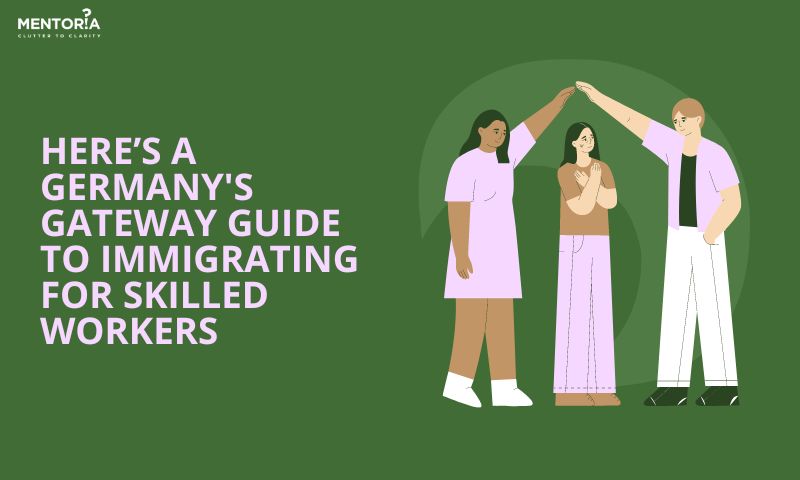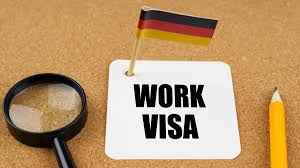Here’s A Germany’s Gateway Guide To Immigrating For Skilled Workers

Germany, known for its rich history, vibrant culture, and robust economy, has become a hotspot for skilled workers from around the world. Whether you’re a tech guru, an engineer, or a healthcare professional, Germany offers a plethora of opportunities. With the New Skilled Immigration Act implemented by Germany, there’s a lot you need to stay updated on. So, this guide will walk you through everything you need to know about immigrating to Germany as a skilled worker.
Why Germany? The Land Of Opportunities
Germany is not just famous for its Oktoberfest and fairy-tale castles; it’s also a powerhouse in the global economy. With a low unemployment rate and a strong demand for skilled professionals, Germany is an attractive destination for those seeking new career opportunities.
Germany’s work culture is another significant draw. Known for its efficiency and balance, the country offers a work environment that respects your time and skills. Plus, the quality of life in Germany is top-notch, with excellent healthcare, education, and a high standard of living. So, if you’re looking for a place where you can grow both professionally and personally, Germany should be at the top of your list.
Understanding The Visa Process
Navigating the visa process might seem daunting, but with the right information, it becomes manageable. The most common visa for skilled workers is the EU Blue Card, designed to attract highly qualified professionals from outside the European Union. To qualify for an EU Blue Card, you must have a university degree and a job offer with a salary that meets the minimum threshold.
In 2024, the minimum salary requirement for an EU Blue Card was set at €56,400 per year i.e. Rs. 50.84 LPA , or €44,304 i.e., 40 LPA for shortage occupations like IT and engineering. Additionally, Germany introduced the Skilled Workers Immigration Act to simplify the process, making it easier for professionals with vocational qualifications to obtain a work visa. Once you have your visa, you can look forward to enjoying the many benefits of living and working in Germany.
The New Skilled Immigration Act
In 2023, Germany introduced the Skilled Immigration Act, simplifying the process for qualified professionals from non-EU countries to work in Germany. This law aims to fill the country’s skill gaps by attracting talented individuals from around the globe. The act includes measures like easier recognition of foreign qualifications, more straightforward visa procedures, and better access to the labour market.
Key Points:
- Qualification Recognition: Foreign qualifications can now be recognised more easily, making it simpler for skilled workers to prove their competencies.
- Visa Procedures: The process of obtaining a work visa has been streamlined, with a focus on making it faster and more efficient.
- Labour Market Access: More sectors are open to foreign workers, especially those with vocational training.
The New EU Blue Card Since November 2023
In November 2023, Germany updated the EU Blue Card regulations, making it even more attractive for skilled workers to move to the country.
- Lower Salary Thresholds: The salary thresholds for the EU Blue Card have been significantly lowered. For shortage occupations and new entrants to the labour market, a minimum salary of €41,041.80 i.e. Rs. 37 LPA applies. For all other occupations, the threshold is €45,300 i.e. Rs. 40.83 LPA.
- Wider Group of People: The Blue Card is now available to a broader group of individuals, including recent university graduates and IT specialists with professional experience, even without a university degree.
- Expanded List of Shortage Occupations: The list of occupations eligible for the EU Blue Card has been expanded to include roles such as IT managers, educators, healthcare professionals, and more.
- Enhanced Mobility: EU Blue Card holders from other EU countries can now move to Germany for short-term (up to 90 days) and long-term employment without needing a visa.
- Facilitated Family Reunification: Family members of EU Blue Card holders can now join them in Germany more easily, without undergoing the visa process beforehand.
Visa Types For Skilled Workers
Germany offers several visa options for skilled workers, tailored to different professional backgrounds and goals.
- EU Blue Card: Aimed at highly skilled workers with a university degree, the EU Blue Card offers a fast-track route to residency and work in Germany.
- Job Seeker Visa: This visa allows qualified professionals to enter Germany and search for a job for up to six months. Once you find a job, you can convert it into a work visa.
- Work Visa for Qualified Professionals: This visa is for individuals with a recognized professional qualification. It provides direct access to the labour market, especially in shortage occupations.
Finding A Job In Germany
Landing a job in Germany as a skilled worker requires some strategic planning. Here are some tips to get you started:
- Use Online Job Portals: Websites like LinkedIn, Indeed, and StepStone are excellent resources for finding job listings in Germany.
- Leverage Professional Networks: Networking is crucial. Attend industry events, join professional groups on LinkedIn, and connect with recruiters who specialise in placing international candidates in German companies.
- Tailor Your CV: Ensure your resume is formatted to meet German standards. Highlight your skills, experience, and language proficiency.
Living In Germany
Moving to a new country involves more than just finding a job. Here’s a quick guide to settling into life in Germany:
- Learning the Language: While many Germans speak English, learning German can significantly enhance your experience and integration into the community.
- Finding Accommodation: Housing can be competitive in major cities like Berlin, Munich, and Hamburg. Start your search early, and consider using real estate websites like ImmobilienScout24.
- Navigating Healthcare: Germany has one of the best healthcare systems in the world. As a resident, you’ll have access to public health insurance, ensuring you receive top-notch medical care.
Fun Facts About Germany
To lighten things up, here are some fun and quirky facts about Germany:
- Bread Heaven: Germany boasts over 300 types of bread! Bakeries are an integral part of daily life, and you’ll find a delicious variety in every town.
- Recycling Pioneers: Germans are serious about recycling. The country has an extensive recycling system, making it one of the most eco-friendly nations in the world.
- Festivals Galore: Germany hosts some of the world’s most famous festivals, including Oktoberfest in Munich and the Cologne Carnival.
Let’s Do It The German Way
Germany is a fantastic destination for skilled workers seeking new opportunities and a high quality of life. With its welcoming immigration policies, vibrant job market, and rich cultural heritage, Germany offers a promising future for professionals from around the globe. Whether you’re drawn by the competitive salaries, excellent work-life balance, or the chance to experience life in the heart of Europe, Germany has something for everyone.
From resume building workshops to interview preparation, Mentoria offers comprehensive services to ensure your success. So, brush up on your German, and get ready to work in Deutschland!










